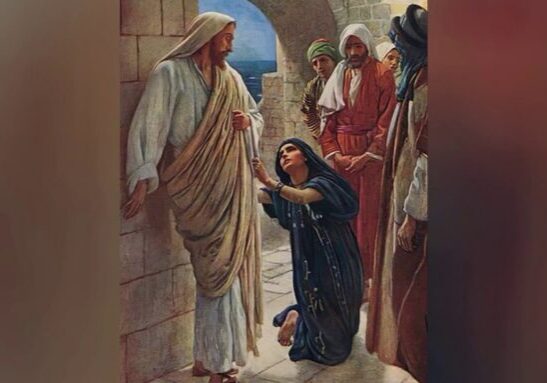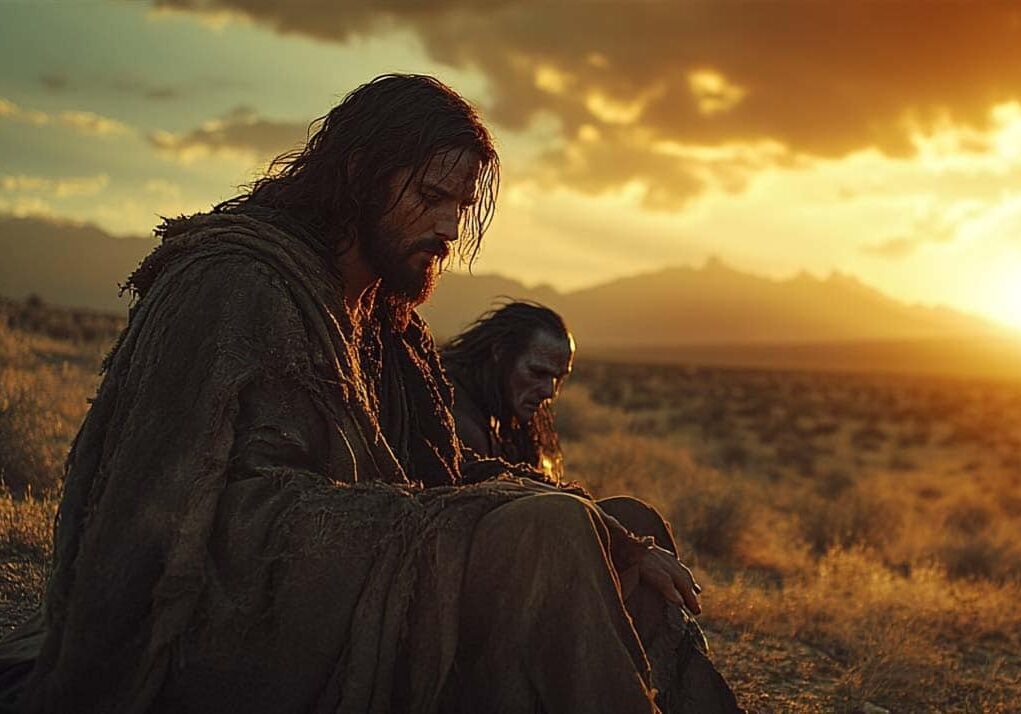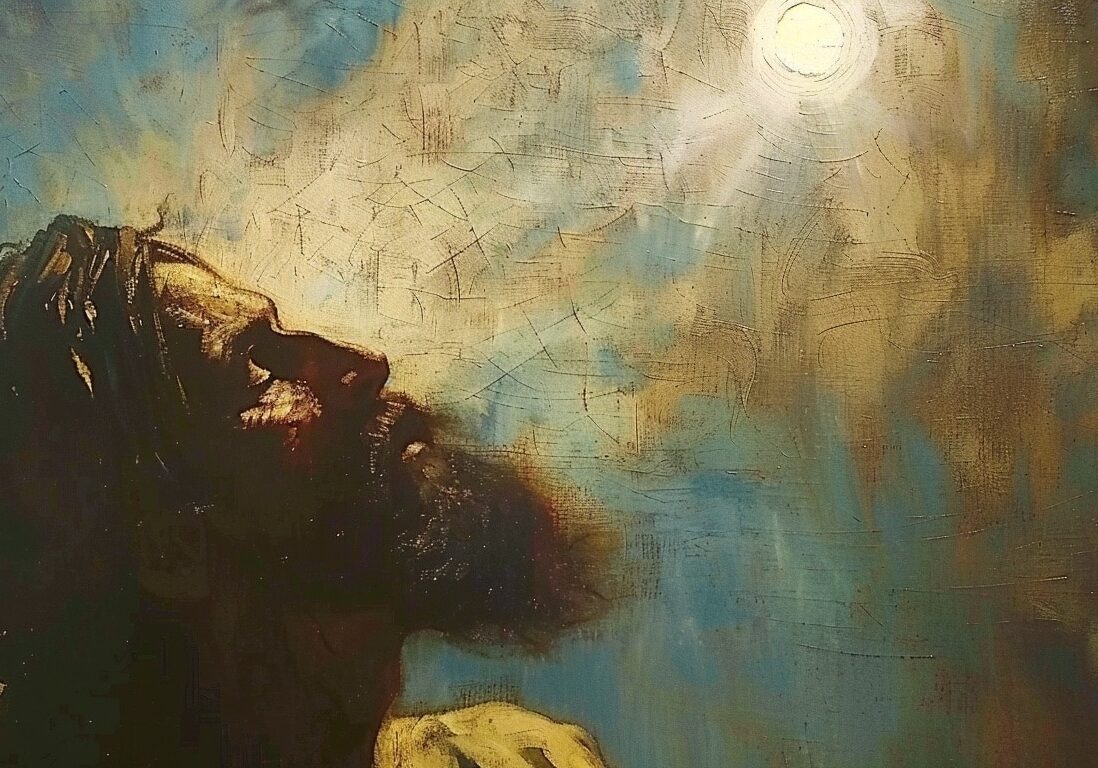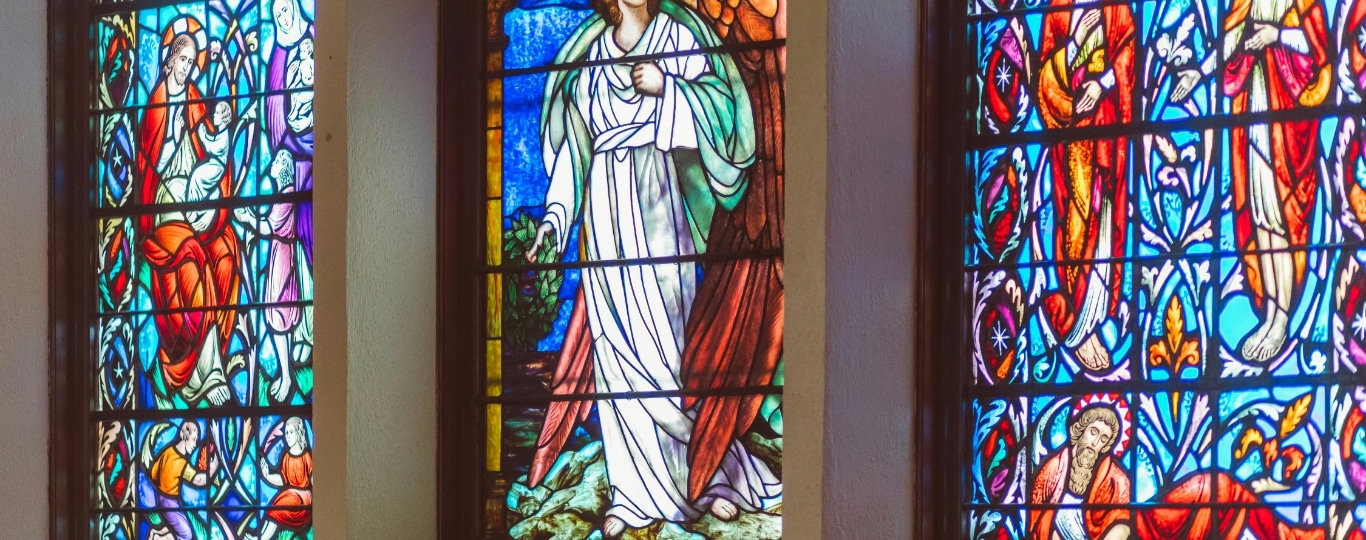†
On the Jewish calendar, the 14th day of Abib is one of most important days. It is the day and month that the Jewish people remember and give thanks to YHWH GOD for the day the Angel of the Lord passed over Egypt, allowing for the exodus of Israel from their bondage to Pharoah. — Fourteen days hence, a fortnight from now, the Jewish people will celebrate this event in a feast called Passover, while at the same time, Christians will celebrate the Paschal Feast of Easter. This is one of the most important days on the Christian calendar. For, Easter marks the day of the Church’s exodus from bondage from sin and death, by the Cross and Resurrection of Christ JESUS, the greater Prophet than Moses – the greater Sacrifice than any Temple offering, and the true reflection of the Father, who presented Himself as the greater good of the things to come.
Being that we are fourteen days from Easter, the Anglican Divines sought to mark this occasion with peculiar Scripture readings. — These readings point more specifically to the work of JESUS as Redeemer – both King and Priest. Next week, on Palm Sunday, there will be no disputing the role of King that JESUS exemplify as the heir-apparent of David, and the one true Messiah. Yet, before the Triumphal Entry, the Anglican Divines want the Church to contemplate Christ’s role as the greater Mediator.
In today’s Gospel Lesson from St. John, chapter eight, JESUS makes a strong case to the executive, religious leadership of Israel, that He was that Prophet that Moses described in Deuteronomy 18:15ff. In our Old Testament Lesson, we heard this prophecy read: “I will raise up for them a Prophet like you, [Moses] from among their brethren, and will put My words in His mouth, and He shall speak to them all that I command Him” (18:18). — To the Pharisees and Scribes, the overseers of Israel’s Temple worship and enforcers of the Torah/the Law of Moses, JESUS says, “I speak to the world the things which I heard from Him … I do nothing of myself; but as my Father taught me, I speak these things … for I always do those things that please Him.” (St. John 8:26,28, 30). — In other words, ‘I am, that Prophet!’
Lest we forget the function and importance of the role of Moses to Israel, we should re-read the story of Moses at the Burning Bush, wherein he spoke directly to GOD. There, GOD told him that He would ‘put His words in Moses mouth … and He would teach Moses what to do.’ (cf. Ex. 4:15) — By the mouth of Moses, GOD rebuked the Pharoah and taught the people of Israel – by his actions, Moses led GOD’s people out of Egypt’s bondage with power and authority, and he instituted the religious system of worship that allowed for Israel’s sanctity and fellowship with GOD ALMIGHTY. For, the mouth of Moses was divinely instructed, and mighty was he in GOD’s Word of Wisdom and Strength of Might. And for this, Moses was esteemed as the mediator of GOD.
Now a mediator is one “who intervenes between two parties, either, to make or restore peace and friendship, or to form a compact, or to ratify a covenant.”1 — Moses’ role as mediator between GOD and Israel was not only ambassadorial, but also sacerdotal. That is, Moses acted not only diplomatically in his role as mediator between GOD and Israel, (speaking on behalf of GOD to the people, and to GOD on behalf of the people), but also priestly; viz. not only as an emissary, but also ceremonially.
Just after Moses led the people of Israel out of Egypt and through the Red Sea, the LORD GOD met Israel on Mt. Sinai to make a covenant with them from atop His holy mountain. — The terms of this compact or covenant, should Israel promise to serve and obey GOD, would ensure peace between the LORD and His chosen people of faith, guaranteeing that GOD would protect them from all their enemies and cause them to grow and expand in the Promised Land of Canaan. In return, Israel was to make no covenant or compact with the foreign people into whose land the LORD would give them, nor were they to make a covenant with the gods of those foreign nations. ‘For it would be of a certainty – if these things happened, the foreign peoples would cause Israel to sin against GOD.’ (cf. Exodus 23:31-33) And to this compact, the people of Israel said: “All the words that the LORD has spoken, we will do” (Exodus 24:3). — But, for a compact or covenant to be executed and enacted, blood must be shed to seal the agreement between the two parties – this is where Moses steps in as mediator.
In the Old Testament, power and might were of great value – the power of an ox when farming; a horse when fighting a war; the strength of a man’s legs in carrying a message and his mighty arm in battle. Yet, to satisfy the righteous requirements of GOD ALMIGHTY, strength of any of His creatures is not very compelling. — We read in the psalms, the following: “GOD’s delight is not in the strength of the horse, nor his pleasure in the legs of a man … No king is saved by the multitude of an army; a mighty man is not delivered by great strength” (Psalm 147:10; 36:16). This is why the LORD tells Israel that He does not choose her as His special people for their great numbers or particular strength or skill. The LORD chose Israel because of the covenant made in blood with Abraham, the father of the Faith.
Blood was the reason GOD was present with Moses in Pharoah’s court, and blood was the reason GOD met Israel at Mt. Sinai. — The lifeforce of GOD, as He told Noah after The Flood, is in the blood. Thus, mankind is not to eat blood, nor is man to shed blood wantonly – either of man or of beast, for life is sacred. (cf. Gen. 9:1-6) — And since GOD’s lifeforce is present in the blood, covenantal agreements were made between two parties, with blood, which signified the positive life of their compact. — It also signified the penalty of either of the parties, if they broke the compact outside of the terms. “In solemn agreements between equals in parity treaties (compacts/covenants), both parties would pass between the blood pieces of a slain animal or bird. The symbol was evident to all: ‘May I become like this [bloody animal], if I do not keep my side of the agreement.”2
So, at Mt. Sinai, upon making their commitments as equals in a parity, blood was required to seal the compact between GOD and Israel. Therefore, at the LORD’s direction, Moses took the blood of the peace offerings that Israel had made unto the LORD at the base of the mountain. “And Moses took half the blood and put it in basins, and half the blood he sprinkled on the altar … And Moses took the blood, sprinkled it on the people, and said, ‘This is the blood of the covenant which the LORD has made with you according to all these words [that you have promised unto Him’” (Exodus 24:8). It was Moses the mediated this covenant between Israel and YHWH GOD, and it was Moses that commanded the people how, when, and where to follow GOD.
In today’s Gospel Lesson from St. John chapter eight, JESUS is professing that the role that Moses played at Mt. Sinai, he would now be assuming as His own – as Mediator between GOD and His people. He was claiming to be ‘that Prophet’ that Moses spoke about in Deuteronomy 18, the one which GOD would raise up to assume the mantle of Moses, and the one, as GOD said, “I will put My words in His mouth, and He shall speak to them all that I command Him.” (18:18) This is why JESUS said, “Most assuredly, I say unto you, if anyone keeps My word, he shall never see death … [And] if ye continue in my word, then are ye my disciples indeed. And ye shall know the truth and the truth shall set you free [from sin and death]” (St. John 8:51 & 31-32). — Like Moses who mediated the true word of GOD that delivered Israel out of bondage and alive into the promised land of Canaan, being set free from Pharoah’s bondage, if anyone would hear and follow the true word of GOD given to JESUS the Christ, the greater Mediator than Moses, then he too will be delivered alive and free from the bondage of sin and death into the Promised Land of the Kingdom of GOD, now.
As we now know, the religious leaders rejected JESUS’ words, just as the Jewish people rejected Moses’ words on many occasions. Now what if someone broke the strict and serious words of the mediator Moses in the covenant of GOD made in blood? — As we mentioned earlier, a covenant breaker’s blood or lifeforce would be required of them according to the oath of compact. — Again, from Deuteronomy 18: “And it shall be that whosoever will not hear My words [that I put in the mouth of My Prophet], which He speaks in My Name, I will require it of that person.” (ver. 19)
Yet, there was an ‘out’, if the offended party would allow for it. — The out was the blood of another – a secondary victim – upon whom the guilt of the first party would be transferred. The offended party, having the moral upper hand in the situation, could accept the sacrificed lifeforce of this secondary party, as an atonement for the offense or the sin of the covenant breaker. — Since the lifeforce of GOD was in the blood of the living, and therefore every life sacred, a life sacrificed for breaking the living compact/covenant was a satisfactory expiation or appeasement for the guilt committed. The LORD Himself prescribed this solution for sin in the Law in Leviticus 17:11 – “For the life of the flesh is in the blood, and I have given it to you upon the altar to make atonement for your souls [when you have broken covenant with me]; for it is the blood that makes atonement for the soul [that has sinned].”
As you might have guessed, it is also the role of a mediator to intermediate, or arbitrate between two parties in a covenant, not only to make the covenant, but also when one party has violated the agreement. Indeed, this is a key function of the mediator, for, it is the mediator who intervenes to make or restore peace and friendship between the two parties when there is a fracture. So, when Israel disregarded and broke faith with GOD concerning the words she promised GOD at Mt. Sinai – ‘to be faithful to Him and His word as spoken by His mediator – it was Moses’ role as mediator to offer a propitiatory sacrifice of blood to cleanse the people of their guilt – thereby restoring peace between GOD and His people.
To accomplish atonement and a return to covenantal parity and peace, Moses, with GOD’s direction, established a system of sacrifices that would accommodate Israel’s daily propensity to break the faith of their Mt. Sinai covenant. This system culminated in the rite of Yom Kippur, or the Day of Atonement, wherein the High Priest, acting as GOD’s mediator, would offer the lifeforce of a set of animal sacrifices that would atone for the sins of the nation.
The mediator, a role played by Moses and the high priest, both of which GOD ordained – was both emissarial and ritual in nature. — This role is vital, for GOD, who is Spirit, requires a mediator with flesh and bone to arbitrate His grace and mercy to His people, also flesh and bone and spirit. — And dear church, what is key, today in particular, is that we understand that this whole dynamic of the role of mediator – emissarial and ceremonial – is instituted of GOD without any persuasion by, or impetus from, GOD’s people. – GOD did it all as Israel’s Savior and Redeemer. — Why? It was because of His passion. It was because of His passion to save, govern, know, and preserve Abraham and his offspring for Himself. It was because of His passion for those who put their trust in Him; those who believe in Him by faith for the words of His Promise – the promise of His compact/covenant.
Now this Old Testament reality would be good enough, but we must go further, because the writer of Hebrews shows us that the Father’s passion is made even more passionate in the Son. As the author of the Letter to the Hebrews details in today’s Epistle Lesson, the words of emissary and acts of ritual in the Old Covenant mediator were valid, but only temporary shadows. We read in Hebrews 10:1: “For the law [was] a shadow of the good things to come, and not the very image of the things, [which] can never with the same sacrifices … continually offered year by year, make those who approach [GOD’s Altar with the blood of bulls and goats], perfect.”
The Old Covenant passion of GOD the Father was pointing towards something and someone even greater. We read in Hebrews: “But Christ JESUS came as High Priest of the good things to come, with the greater and more perfect tabernacle not made with hands, that is not of this creation” (Hebrews 9:11) – which Holy Thing was His Body and Blood. Where GOD showed His redemptive passion for Israel through emissarial and ceremonial shadows, JESUS showed in a more perfect way as GOD’s Mediator on Good Friday. “For Christ has not entered the holy places made with hands, which are copies of the true, but into heaven itself, now to appear in the presence of GOD, [as Mediator], for us … He has appeared to put away sin by the sacrifice of Himself” (Hebrews 9:24 & 26). — But perhaps I am getting ahead of myself; we have not even sung ‘Hosanna in the Highest!’, nor walked with palm branches waiving with our LORD through the gates of Jerusalem yet.
Dear people of GOD, today is Passion Sunday – GOD’s Passion Sunday. His passion, not for a people of some certain ethnic or racial heritage – but His passion for a people of faith, who want to enter into parity with Him in holy covenant. We can look to the Old Testament for the signs, symbols, and meaning of GOD’s passion this Sunday, and we will find it. Yet, we cannot stop there, for JESUS of Nazareth said these amazing words: “He that hath seen me hath seen the Father” (St. John 14:9). That is what this Sunday is all about: finding the passion of GOD the Father for His special people in the passion of the Son, JESUS Christ. — JESUS said: “It is my Father that honors me … [and] I speak to the world” (St. John 8:26 & 54). If we will look and listen to JESUS as GOD’s Mediator, speaks to the whole cosmos the passion of GOD.
The Fifth Sunday in Lent is called Passion Sunday, because the Epistle and the Gospel lessons unveil the passion of GOD the Father in GOD the Son, JESUS Christ. “The Epistle [Lesson] makes distinct mention of the shedding of Christ’s blood, and the purpose of His death. The Gospel gives an account of that [beginning] attempt of the Jews upon JESUS’ life.”3 These things signal the commencement of JESUS’ Passion – the divine passion of the Father, seen in the Son, to save, govern, know, and preserve Abraham’s offspring of faith-filled people. If we are those people, brothers and sisters, then when we see the passion of the Son, we also see the passion of the Father – the divine passion, by His great goodness, to govern us as King, and preserve us as Savior, both in our bodies and in our souls. Amen.
1 BlueLetterBible.org. “Thayer’s Greek Lexicon; Hebrews 8:6; μεσίτης (mesites)”. Accessed 3 April 2025. https://www.blueletterbible.org/lexicon/g3316/kjv/tr/0-1/.
2 Nelson KJV Study Bible, “Footnote of Genesis 15:17”, (Grand Rapids: Harper Collins Christian Publishing Co., 1982), 27.
3 Goulburn, Edward M., D.D., D.C.L, The Collects of the Day: An Exposition Critical and Devotional of the Collects Appointed at the Communion, (London: Longmans, Green & Co., 1897), 169.
Join Us for Biblical Worship, Study, & Fellowship
Sundays:
Morning Prayer 9:45 am
Coffee & Catechesis 10:30 am
Holy Communion 12:00 pm
Thursdays:
Holy Communion 6:00 pm
Recent Sermons




